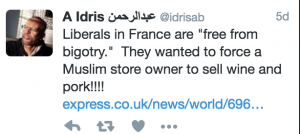These two stories both raise interesting questions about the parameters of secularism. It was reported a few days ago that a French supermarket had been told it had to stock pork and alcohol or face closure.
Good Price discount mini-market in Colombes has been told by the local housing authority, from which it rents its premises, that it has not followed the conditions on the lease that stipulate that the shop must act as a “general food store.”
The authority argues that all members of the local community are not being served properly if there are no alcohol or pork products in the Good Price store, which is run as a franchise and which last year replaced another small supermarket.
It did not at first seem easy to judge whether this was a fair decision or, possibly, an example of unfair or disproportionate scrutiny. It depends how you interpret ‘general food store’ – I would have thought a shop could be halal-compliant and still be a general food store. On my own local high street halal stores exist alongside mainstream small supermarkets, off licences and a traditional butchers shop. If the Colombes store was operating within a similar context the local authority might seem heavy handed.
However this Youtube video reveals that this is not a minimart but a fairly large store – making it more likely that its failure to offer a full range of goods would cause inconvenience. It might perhaps be asked whether, in an area with many Muslims, a ‘general food store’ should try to accommodate those customers by offering halal options in addition to pork and alcohol. That could be seen as the logical implication of this comment, made by the Mayor’s chief of staff.
“We want a social mix,” Mr Besnard added. “We don’t want any area that is only Muslim or any area where there are no Muslims.”
Some responses to the local authority’s step were disproportionate and misleading.
However click bait coverage in the mainstream press encouraged such reactions.
By contrast this story, reporting that ‘burkinis’ have been banned from the beach in Cannes, seems of more genuine concern.
It’s true that the French are fussy about swimwear. If you try wearing baggy shorts in the pool you’ll likely get told to change into something more close fitting for hygiene reasons. Obviously a baggy burkini would fall foul of this (common) regulation. However it’s clear that in the case of Cannes the motivation was ideological.
David Lisnard said they are a “symbol of Islamic extremism” and might spark scuffles, as France is the target of Islamist attacks.
There is a complex relationship between violent and non-violent extremism – but the burkini is not extreme – just conservative. (This site, offering swimwear suggestions to orthodox Jewish women, includes a link to a range originally designed for Muslim women.)
Here’s some more detail from another report:
Cannes mayor David Lisnard issued an ordinance in late July forbidding beachwear that doesn’t respect “good morals and secularism”. It said swimwear “manifesting religious affiliation in an ostentatious way, while France and its religious sites are currently the target of terrorist attacks, could create risks of trouble to public order”.
Secularism should be concerned with protecting people from the imposition of religious codes, not dictating how people dress. Niqabs and burkas are of course already banned in France – but the burkini doesn’t conceal the face. Many people don’t like the garment, for valid reasons, but just because it is offensive to some is no reason to ban it.



